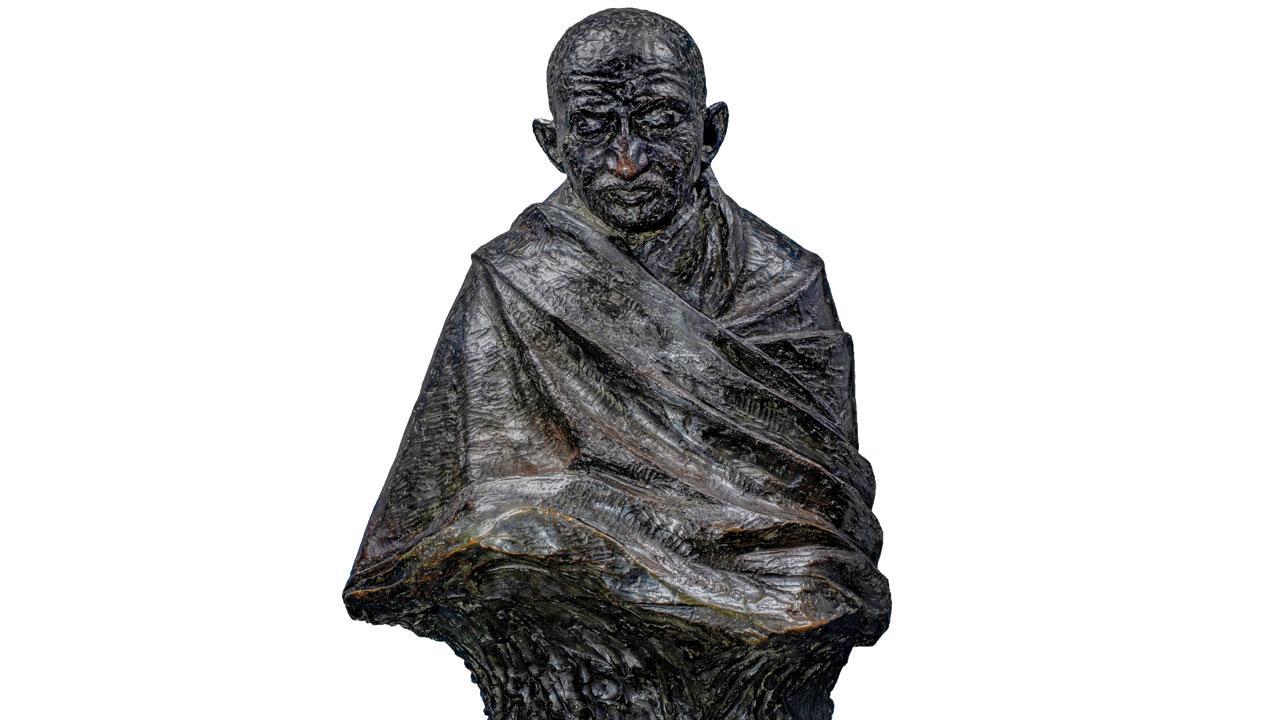Today, on International Museum Day, a talk by director general Sabyasachi Mukherjee will trace the journey of a bust of Mahatma Gandhi sculpted by Winston Churchill’s cousin, that travelled from London to CSMVS

The British were extremely particular about the height of the pedestal. There was constant communication between the museum trustees and the British officials because they wanted it to be the same height as the other leaders. Pic Courtesy/CSMVS
Like all cultural institutions, Chhatrapati Shivaji Vastu Sangrahalaya (CSMVS) is shut right now but a bust of Mahatma Gandhi that is displayed in front of the Textile Gallery makes us wish it was open for a quick revisit. This exhibit that lay forgotten in the museum’s collection for decades, had an interesting trajectory, from fame to obscurity, and is now back in the public eye.
ADVERTISEMENT
Clare Sheridan. Pic Courtesy/Wikimedia Commons
Pieces of the puzzle
“It is common with curators and directors to look for new discoveries. In 2012, while on such a trail, I noticed a wrapped up exhibit in the storage room. When our staff removed its packaging, the bust of Mahatma Gandhi was unveiled. A closer inspection of this metal bust disclosed that it was loaned to the museum by the Viceroy of India; its sculptor was Clare Sheridan and its accession [museum registration] number was 40.4,” shares Sabyasachi Mukherjee, director general, CSMVS. Today, he will be conducting a virtual talk to explain how it arrived at the nearly 100-year-old museum and its famous English sculptor. “The accession number revealed that it arrived at the museum in 1940. After I began reading up on the minutes of meetings in our archives, I learned that it was presented by the Maharajah of Darbhanga who gave it to the Viceroy and Governor General of India at the time, Lord Linlithgow. The bust had arrived in Bombay, and the then Governor had taken charge until the Viceroy decided that it would finally be placed at Prince of Wales Museum (today’s CSMVS),” shares Mukherjee, adding that the terms and conditions of the Maharajah’s letter indicated a strong desire for it to be displayed in the Viceroy’s residence. “And yet, it arrived here,” says Mukherjee, stoking our curiosity.
Sculpting history
Clare Sheridan, a cousin of Winston Churchill, was one of the most sought-after sculptors in the early 20th century. “She and her cousin had ideological differences. She was also a journalist and a travel writer. Her lifestyle was bohemian, and her artistic exploits took her to Russia, where she sculpted Vladimir Lenin and Leon Trotsky. She had also created busts of leading personalities like HG Wells and Charlie Chaplin.” Sheridan was keen to sculpt Gandhi who was in London for the First Round Table Conference in 1931.
Sabyasachi Mukherjee
The Maharajah also happened to be a part of the delegation. Sheridan reached out to Sarojini Naidu, who was able to schedule a few hours from Gandhi for her to sculpt this bust. “Despite Churchill refusing to meet Gandhi in London on that visit, his cousin struck a chord; even his son Randolph met Gandhi. Such was his influence; he was the toast among English circles. Famous American sculptor Lowe Davidson flew down from the US to make his bust at the same time.” Gandhi called Sheridan a good friend and cordially invited her to India; “When you arrive, you will be a guest to all of India,” he told her. On her part, Sheridan in her autobiography referred to Gandhi as “a saint-like personality.”
Our curiosity is put to rest about its final home at CSMVS. “Despite the prevalent mood of the time, the Viceroy held several meetings with Gandhi, and developed an admiration for him. It’s probably why he felt that the bust should be displayed in this museum alongside other prominent personalities like Napoleon and the Duke of Wellington,” Mukherjee signs off.
Time: 5.30 pm
Log on to: @csmvsmumbai on Instagram (for more details)
Also check out
Museum and You: Dr Bhau Daji Lad Museum is inviting enthusiasts to share their favourite memories of visiting this historic landmark. Be it a fascinating object, a striking art display or a workshop, it can all be part of this memory. These will be reposted on the museum’s social media handles. Responses can be written in any language of your choice.
Till: May 18
Email: [email protected]
Telling a story - Museums and Exhibitions: Advocate and solicitor Rajan Jayakar, one of India’s most celebrated collectors of antiquities, will share his experiences of curating exhibitions and setting up museums organised by V Talks, part of Vidyalankar Institute of Technology.
Time: 6 pm
Log on to: Zoom
A New Beginning: Reimagining the Raja Ravi Varma Museum: TAP Talks and Sree Chitra Art Gallery will hold a talk where Ganesh Shivaswamy, curator, Sree Chitra Art Gallery, Zeba Maria, architect and design head, Quern Design, and S Girikumar, art conservator, discuss the history, conservation, and architecture of the Sree Chitra Art Gallery, Thiruvananthapuram.
Time: 8 pm
Log on to: Facebook Live
 Subscribe today by clicking the link and stay updated with the latest news!" Click here!
Subscribe today by clicking the link and stay updated with the latest news!" Click here!






